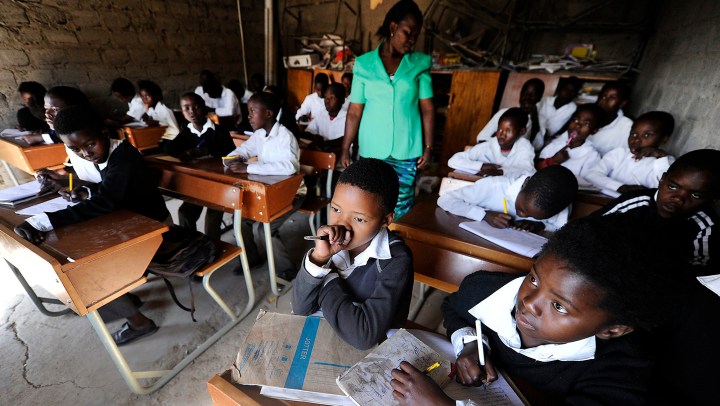OP-ED
Salvaging the school year: Learning must continue for all, especially Grades 8 and 9

Whereas schools for the rich and middle class shift relatively seamlessly between contact and online learning, there is no such opportunity for the hundreds of thousands of learners who attend under-resourced schools. For these learners, when schools close, teaching and learning stops.
On 31 August, Obakeng, a Grade 8 learner from Alexandra, Johannesburg, will return to school for the first time since March. He has done two hours of maths every day since April, supported by dedicated tutors using WhatsApp. He is not alone. There are over 600 learners like him in Gauteng who have participated in a structured mathematics programme during lockdown, run by an NGO, OLICO Maths Education. The initiative makes use of basic smartphones and crowd-funded WhatsApp data bundles. Learners say things like, “Thanks for the maths worksheet. Staying at home is boring, now we have something to do.” (Followed by plenty of emojis!)
Obakeng has learned to deal with fractions and negative numbers, solve equations and has made substantial progress in geometry. By contrast, most Grade 8s and 9s have done no mathematics since March and are likely to have forgotten the mathematics they learned in Term 1.
Whereas schools for the rich and middle class shift relatively seamlessly between contact and online learning, there is no such opportunity for the hundreds of thousands of learners who attend under-resourced schools. For these learners, when schools close, teaching and learning stop.
Our concern is with the teaching and learning of mathematics, and we are especially concerned with Grade 8s and 9s – this is where we and our colleagues spend much of our time and energy, doing development work and researching its impact.
Research shows that experiences during this early phase of high school correlate significantly with whether or not learners drop out of school before matric. Fewer than 50% of Grade 10 learners in 2017 completed Grade 12 in 2019. We cannot afford for this statistic to worsen.
In mathematics, these years are also a crucial transition point, moving from a focus on numbers to the basics of algebra, and from informal explorations of space and shape to more formal geometry. If we do not pay attention to these grades now, we will carry the burden of this neglect for years to come.
We agree with Professor Jonathan Jansen that the school year cannot reasonably be salvaged, apart from Grade 12, and possibly Grade 7, but we think it is more useful to shift the discourse from salvaging or retrieving the academic year and instead work from where we are and look forward. Let’s treat August 2020 to December 2021 as a continuous period of learning. But what exactly will they be learning? Up to now, the focus has been on the “how” of teaching/learning – using technology or not, using radio, TV, social media, etc. It’s time to talk about the “what” – what will they be learning when they return to school?
Typically “recovery curricula” involve a big push to catch up lost time by rapidly skimming through vast amounts of content. Research suggests that this exacerbates the situation rather than fixing it. The Department of Basic Education (DBE) has already published and disseminated “trimmed curricula” but these do not take into account that learners will have forgotten much of what they learned in Term 1. Nor do they take into account that learners are likely to attend school for approximately 50% of the time once they return.
In addition, the “trimmed” curricula continue to ignore the fact that the majority of Grade 8 and 9 learners do not cope with the curriculum under normal circumstances. We know well the disastrous Annual National Assessment (ANA) results of 2012 to 2014 where the average mark in mathematics for Grade 9 was below 14% each year. As a matter of urgency, we need to plan a mathematics learning programme for Grades 8 and 9 which spans the period from August 2020 through to the end of 2021 and which focuses first on the core concepts learners will need to progress in their learning of mathematics.
For the next 4-5 months (at least), the programme must take into account that meaningful learning must take place both inside and outside school. This will require careful consideration of what might best be delivered by a teacher in class and what can be done via printed material or through online learning (where possible) at home.
The OLICO experience of WhatsApp tutoring along with the zero-rating of many educational websites indicates that an entry-level smartphone and a WhatsApp data package can be used to facilitate meaningful and connected learning at a low cost. This has been echoed in the experience of other NGOs working in both urban and rural contexts. However, the switch from in-person teaching to a remote or hybrid version of teaching and learning is not a simple one. It takes considerable time and effort to develop and deliver suitable material in this way. It also requires careful thought about mechanisms to ensure learners and teachers continue to feel supported, connected and motivated through the periods of remote learning.
Ensuring our Grade 8s and 9s engage in meaningful learning this year and next will require a substantial reprioritisation and reorganisation of the current trimmed curricula so that, in a reasonable and well-paced manner, learners are able to engage with the key content areas, and teachers have sufficient time to address gaps in learners’ prior knowledge. It will also require support for teachers who are preparing lessons that will work in new modes of teaching. Irrespective of whether schools are open or closed, all learners must be given the opportunity to learn.
The DBE has already made huge strides in this direction as captured in the document Teacher Guidelines for Implementing Revised Annual Teaching Plans (ATPs). This document emphasises the need for teachers to work with learners where they are at. To address learners’ backlogs, to take time to remediate, to assess only what they have taught and to prepare learners in the best way possible for 2021.
What we need now is a carefully considered programme, informed by the realities on the ground, which identifies the core content for learners to master before the end of the year and heading into 2021. This is the core that we want to secure, not a collection of topics that reflect a rush to cover as much content of the current grade as possible. Our call is to #SecureTheCore. DM
Craig Pournara is an associate professor in the Wits School of Education. He is the interim SARChI Chair in Mathematics Education at Wits and director of the Wits Maths Connect Secondary Project.
Lynn Bowie holds a PhD in mathematics education. She is the national mathematics coordinator at OLICO Maths Education.
Both have served on ministerial and/or Umalusi committees related to mathematics education. Both write in their personal capacities.
















 Become an Insider
Become an Insider